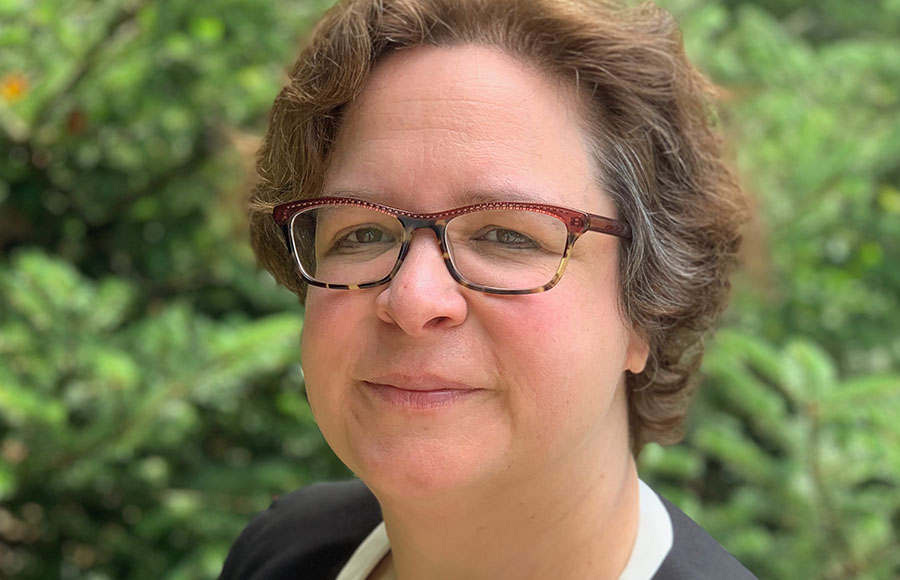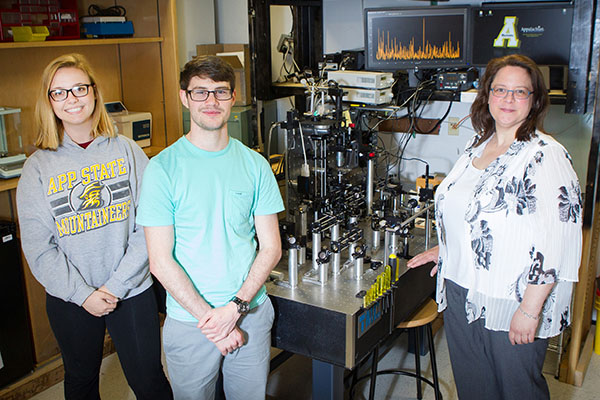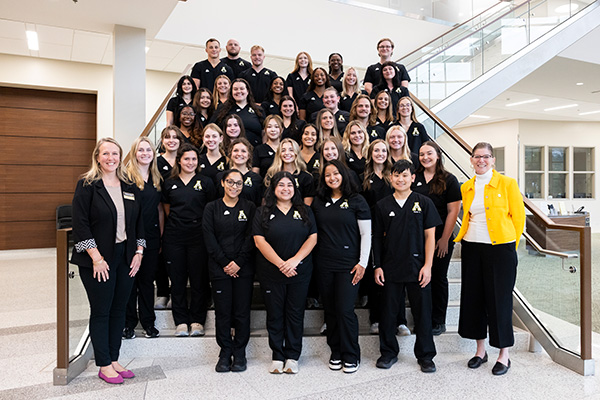Dr. Jennifer Burris
Professor and chair
Department of Physics and Astronomy
2020 Diversity and Inclusion Advocacy Recognition
The Optical Society (OSA)
BOONE, N.C. — Dr. Jennifer Burris, professor in and chair of Appalachian State University’s Department of Physics and Astronomy, has been recognized by The Optical Society (OSA) for “facilitating systemic changes that have improved diversity and inclusion for her department, university and community.”
During her time at App State, Burris has worked to both increase the number of underrepresented students in the Department of Physics and Astronomy and support all the department’s students through her teaching, mentorship and one-on-one research engagement. She has also helped students obtain grants and fellowships, and she worked with faculty, staff and donors to secure funding to develop a free food pantry for students in the department.
Burris is one of three recipients internationally to be honored with OSA’s 2020 Diversity and Inclusion Advocacy Recognition, and one of nine individuals and organizations to receive the award since its inception in 2018.
According to OSA, this recognition “acknowledges the outstanding dedication and accomplishments of OSA members, companies or organizations that demonstrate efforts to foster greater appreciation, advancement and celebration of diversity and inclusivity.”
Valuing diversity and inclusion — ‘the ultimate goal’
In the OSA video announcing the awards, Burris said, “I believe that not only should valuing diversity and inclusive excellence be the goal of any fair and just society, but a campus environment that values diversity produces better student learning outcomes — the ultimate goal of any university.”
As the first woman to chair App State’s Department of Physics and Astronomy, Burris developed a student inclusive advisory board that evolved into Students for Inclusive Excellence in STEM — a club focused on educating and promoting inclusive excellence and diversity in all STEM (science, technology, engineering and math) departments through outreach and departmental involvement.
Additionally, Burris has facilitated required bias and inclusivity training for the department’s faculty and staff, and has been involved in hiring staff and faculty from underrepresented populations.
She has also helped procure funding for creating and promoting diversity and inclusion on App State’s campus, including a nearly $1 million National Science Foundation grant to implement ADVANCE APPALACHIAN — a program designed to promote gender equity in STEM fields at App State, with an emphasis on women from underrepresented populations.
This program will expand Burris’ diversity and inclusion work across all STEM departments at App State, as it will offer a combination of training, professional development, mentoring and work-life resources for the university’s faculty and staff over the next three academic years (2020–21 to 2022–23).
At the state level, she has served as an advisory board member of the BRIDGES Academic Leadership Program for Women, sponsored by the University of North Carolina at Chapel Hill, and helped reestablish the North Carolina American Council on Education (NC ACE) Women’s Network to support all women in higher education in North Carolina. Burris is an executive board member and treasurer of NC ACE.
More about Dr. Jennifer Burris
Burris joined the faculty in App State’s Department of Physics and Astronomy in 2007. She has also served as associate dean in the university’s College of Arts and Sciences and as director of App State’s Master of Science in engineering physics degree program.
She is active at the national and state levels of the American Association of Physics Teachers and is currently on the editorial board of The Physics Teacher, a peer-reviewed academic journal.
Burris regularly mentors App State students in STEM fields and actively recruits and collaborates with students in the university’s Biophysics and Optical Sciences Facility (BiyOSeF). Her multidisciplinary research involves optical engineering and studies of biological systems.
In 2015, she was honored with the University of North Carolina Board of Governors Excellence in Teaching Award, and in 2013, she received App State’s Harvey R. Durham Outstanding Freshman Advocate Award.
She received her Bachelor of Science degree in applied science–physics from UNC-Chapel Hill and both her M.S. and Ph.D. in physics from Colorado State University.
About OSA
Since its founding in 1916, The Optical Society (OSA) — formerly known as The Optical Society of America — has been the world’s leading champion for optics and photonics. Photonics is the science and technology of generating, controlling and detecting or photons, or light particles.
OSA unites and educates scientists, engineers, educators, technicians and business leaders worldwide to foster and promote technical and professional development. Through publications, events and services, the society is helping advance the science of light by addressing the ongoing need for shared knowledge and innovation.
The organization currently services 395,000 customers and 23,000 members from more than 100 countries.
What do you think?
Share your feedback on this story.
About the Department of Physics and Astronomy
The Department of Physics and Astronomy’s curriculum has an applied nature that includes a core of fundamental physics courses and laboratory experiences. The department prepares graduates for a variety of scientific, teaching or engineering professions, as well as future educational endeavors. Learn more at https://physics.appstate.edu.
About the College of Arts and Sciences
The College of Arts and Sciences (CAS) at Appalachian State University is home to 17 academic departments, two centers and one residential college. These units span the humanities and the social, mathematical and natural sciences. CAS aims to develop a distinctive identity built upon our university's strengths, traditions and locations. The college’s values lie not only in service to the university and local community, but through inspiring, training, educating and sustaining the development of its students as global citizens. More than 6,800 student majors are enrolled in the college. As the college is also largely responsible for implementing App State’s general education curriculum, it is heavily involved in the education of all students at the university, including those pursuing majors in other colleges. Learn more at https://cas.appstate.edu.
About Appalachian State University
As a premier public institution, Appalachian State University prepares students to lead purposeful lives. App State is one of 17 campuses in the University of North Carolina System, with a national reputation for innovative teaching and opening access to a high-quality, cost-effective education. The university enrolls more than 21,000 students, has a low student-to-faculty ratio and offers more than 150 undergraduate and 80 graduate majors at its Boone and Hickory campuses and through App State Online. Learn more at https://www.appstate.edu.















